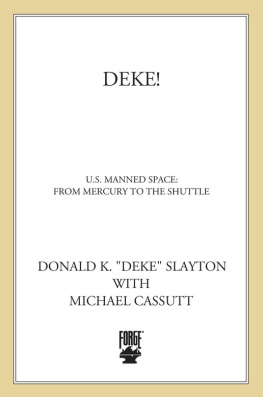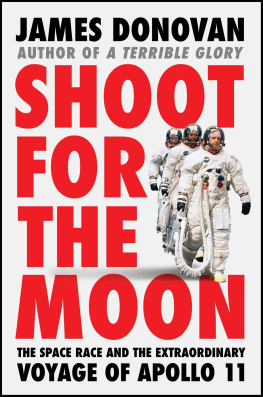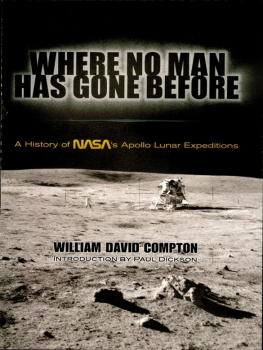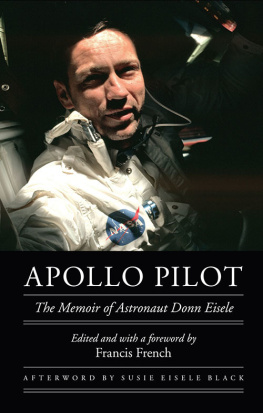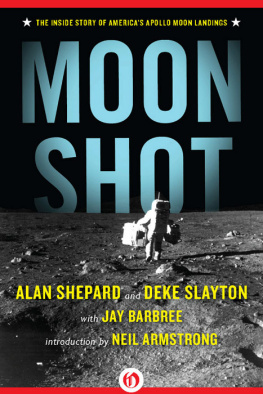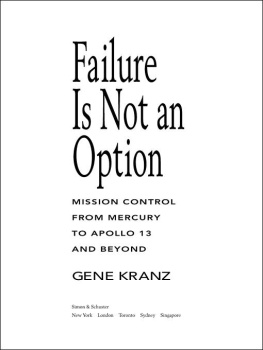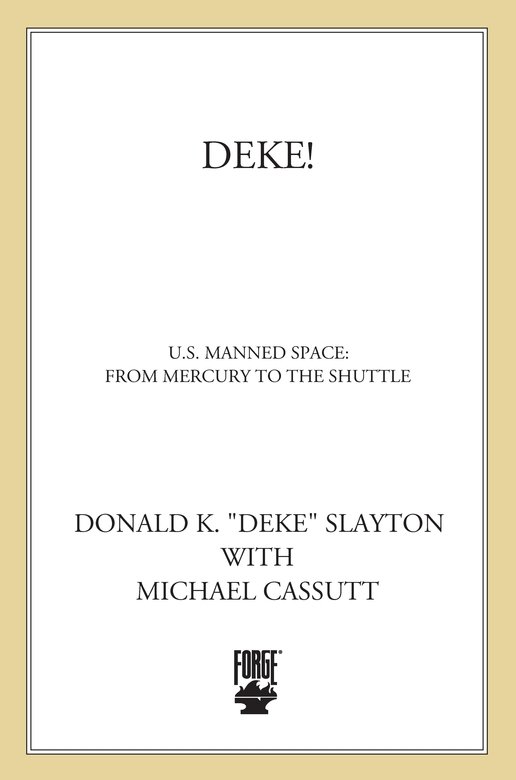Deke Slayton died of cancer at his home in League City, Texas, on the morning of June 13, 1993. The following Saturday there was a public memorial service at the NASA Johnson Space Center, attended by four hundred friends, family members, and co-workers. Speakers at the memorial, organized by Alan Shepard, included John Glenn, Wally Schirra, Bill Dana, Alexei Leonov, Bob Thompson, Dusty Dowd, David Hannah, and NASA Administrator Daniel Goldin.
Deke and I began to work on his autobiography in the summer of 1991, conducting several hours of interviews over the next year. When medical reasons forced him to curtail his travel, we continued our conversations by telephone. This book is based on those conversations, supplemented by Dekes personal papers and previously published accounts. (Two books which were especially helpful must be noted here: Manned Spaceflight by David Baker and Apollo: The Race to the Moon by Charles Murray and Catherine Bly Cox.
However, it would not have been possible to finish this book without the reminiscences of Dekes friends, so my thanks to Joseph Allen, Dr. Charles Berry, Eugene Cernan, Dr. William Douglas, Bob Drew, David Hannah, James McDivitt, Dee OHara, Tom McElmurry, Harold Bud Ream, Thomas Stafford, Walt Williams, and Robert and Dot Thompson. (Some of the other voices were adapted from presentations at Dekes memorial.)
Bobbie Slayton, Kent Slayton, and Marie Madsen were also generous with their time and memories in what turned out to be a difficult year. Joani Loveless was also a lifesaver.
At NASA I was helped by Joey Kuhlman of the History Office and Becky Fryday of Media Services. Lois Morris of the Woodson Research Center at Rice University, and David Shayler of Astro Info Service, also provided valuable materials.
I must also thank our agent, Richard Curtis, and Deke! s editor, Beth Meacham, who believed in this project from the beginning and made it happen.
Michael Cassutt
BEGINNINGS
I guess when it comes to space and aviation, Ive seen and done a lot in fifty years. My name isnt the first one to come to mind when somebody says the word astronaut, but I was one of the original Mercury guysthe one who got screwed out of a mission for medical reasons. I hung in there and wound up running the Astronaut Office. Neil Armstrong became the first person to walk on the moon because I selected him. I eventually got into space, however, on Apollo-Soyuzthirteen years after I should have.
When I was four years old, growing up on a dairy farm in Wisconsin, I was fond of running across the country road to the neighbors place. There wasnt much traffic on that road, but my mother was terrified that Id get hit by a truck. With three other children younger than me, she had her hands full and her eyes elsewhere.
So whenever she let me out into the front yard, she tied me to a tree with a rope. I was tethered like a puppy. I could run around, but only so far. I certainly couldnt reach the road.
Eventually I convinced my mother that I wasnt going to go running into the road, and I was set free. But I can make the case that ever since I was young I have wanted to explore and people have tried to stop me.
Its not as though there was anywhere to run to. The Slayton farm was a mile north of Leon, Wisconsin, which itself wasnt much more than a wide spot in Highway 27, which runs south of the city of Sparta. Sparta was a small town in those daysI remember the population well, because it was the same as the number of feet in a mile5,280. I think its now grown almost to a nautical mile, 6,010 or something.
In 1959, the year I was selected as a Mercury astronaut, Leons populationwas 150. It probably still is, for all I know. It had a general store named the Farmers Store, a feed mill, a couple of filling stations, a garage, and two farm implement dealers.
I had an older half sister, Verna, and an older half brother, Elwood. My dad, Charles Sherman Slayton, was married once before, but his first wife died when Elwood was born. Elwood was farmed out to an aunt to raise, so he was more like a cousin than a brother he didnt live with us.
Verna, who was four years older than Elwood, did live with us. She eventually died of multiple sclerosis. Elwood is still up in Wisconsin.
My dad remarried to Victoria Larson, and Im the oldest from the second marriage. Ive got a brother, Howard, one year younger. A sister, Bev, a year younger than he is. A sister, Marieshes two years younger than Bev. My youngest brother, Dick, is nine years younger than I am. So thats the family.
I should point out that to my family, and to the rest of the world until I was in my thirties, I was always Don Slayton. Nobody called me Deke until I became a test pilot at Edwards in the 1950s.
Slayton is supposed to be English, but three of my grandparents came from Norway. The English one weve traced back to New England somewhere. My dad used to say he was probably a cabin boy or horse thief. There are a lot of Slaytons around the country, Ive discovered. I go someplace and somebody pops up to say hes my relative via this channel, forty times removed.
My dad was an avid reader, even though all he had was an eighth grade education. He took the Saturday Evening Post and the Farm Journal. When I was a little older he even became the township tax collector, but managed to stay liked by everyone.
He took jobs because farming was a tough way to make a living, especially in the thirties. Nobody had money in those days and by most standards we were poor. We reused Christmas and Valentines Day cards to save a few pennies. But, fortunately, being on a farm, we never worried about starving to death. We always had plenty of good, healthy food to eat. We didnt have fancy clothes, but for farming all you need are old overalls.
My dad used to go out and run a road grader for the county, building roads. Thats how we got cash. Vernas husband really ran the farm.
Entertainment was a luxury. I do recall being taken into Sparta once to see my first movie, which turned out to be some Nelson EddyJeanette MacDonald thing. My parents must have liked it, but I didnt. Ive hardly been to a movie since.
We didnt even have a radio until I got to high school, because we didnt have electricity. For a while we had a Delco battery plant set up in the basement of the house. That gave us electricity for lights, but not much. It was only after I left in 1942 that we got 110-volt electricity.
No indoor plumbing, either. That didnt come in until we got electricity.
(Growing up the way I did, Im still amazed at the number of things that are electrical these days. Once I had a conversation with a guy about nuclear war and nuclear winter. He was telling me it wouldnt bother him: hed just jump in his car and head out to the country. I pointed out that his car probably had an electronic ignition and if he tried to put gas in the car the pumps were also electrical.)
Fishing was something we did all the time. There was a stream down in back, half a mile from where we lived. All you had to do was cut a cane pole and get a piece of string; hooks were cheap. You could get a lot of entertainment for very little.
I also started hunting when I was very young: I was using a gun from the time I was six years old, and bought an old sixteen-gauge shotgunsingle shotwhen I was eight or nine. I think I paid a dollar and a half for it. It didnt work half the time. It had an outside hammer. I cant remember how many times Id find a rabbit and pull to shoot the son of a gun and the gun would misfire. You could say I did a lot of unintended game conservation in those days.

